Diabetes and Your Oral Health
Diabetes affects nearly 16 million Americans and nearly 800,000 new cases are diagnosed each year. Native Americans suffer from diabetes at a greater rate than the general population. Diabetes can cause problems with your eyes, nerves, kidneys, heart, as well as oral health problems.
Let the dentist know if there have been any changes in your medical history, especially if you have been diagnosed with diabetes. Your dentist may request a test of blood sugar to see if your diabetes is under control and may prescribe antibiotics to minimize your risk of infection during dental treatment. Some drugs used in dental treatment may have an impact on controlling your diabetes; therefore it is important to bring the names of all your prescriptions and over the counter drugs to your dental visit. Diabetes can lower your resistance to infections and slow the healing process. Dental procedures may create the potential for delayed healing and will require a change in diet or medications.
The most common oral health problems associated with diabetes are:
- Tooth Decay – Uncontrolled diabetes can lead to high glucose levels in the saliva which may allow decay causing bacteria to thrive.
- Periodontal Disease –Is an infection of the gums and bones that support the teeth. Diabetes reduces the body’s ability to resist this infection.
- Salivary Gland Dysfunction – Diabetic patients may experience a dry mouth (lack of adequate saliva). Constant dry mouth can lead to inflamed and painful soft tissues, as well as an increased risk for tooth decay.
- Fungal Infections – A reduced amount of saliva and high salivary glucose levels can lead to an increase in fungal infections (thrush).
- Infections – Infections make it more difficult to control blood glucose levels. It may be necessary for your dentist to prescribe antibiotics if you are having extensive oral surgery procedures.
If you have been diagnosed with diabetes it is important to practice good oral hygiene at home, follow your physicians dietary and medication instructions and schedule regular dental check-ups.

TENDER AND SWOLLEN GUM


 California Area Office
California Area Office